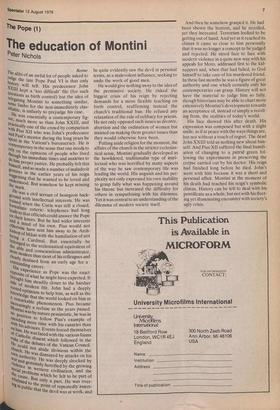The Pope (1)
The education of Montini
Peter Nichols
Rome Rome The alibi of an awful lot of people asked to
luclge the late Pope Paul VI is that only nistory will tell. His predecessor John XXIII kept a 'too difficult' file (for such questions as birth control) but the idea of
relegating Montini to something similar,
scune limbo for the non-immediately classifiable, is unfairly to prejudge his case. He was essentially a contemporary figure, much more so than John XXIII, and Practically one of the crowd by comparison with Pius XII who was John's predecessor and Paul's mentor during the long years he ,sPeur in the Vatican's bureaucracy. He is `°,ureniporary in the sense that one needs to Lel' on the opinions of people who lived Larough his immediate times and anxieties to
inni proper justice. He probably felt this "unself, and so made a number of maladroit gestures in the earlier years of his reign
suggesting that he wanted to be loved and understood. But somehow he kept missing the mark. FHe was a civil servant of bourgeois backeund with intellectual interests. He was pined when the Curia was still a closed, rtnalistic coterie: telephones had long each so that officials could answer the Pope °an their knees. But he had wider interests 011,,,_cl a mind of his own. Pius would not C'erwise have sent him away to be Arch be,°13 of Milan with the humiliation of not C:ng a Cardinal. But essentially he the to the ecclesiastical equivalent of nie able and conscientious administrator, eic)re modern than most of his colleagues and
oearlY destined from an early age for a tilats.tanding career.
exPerience as Pope was the exact bPPosite of what he might have expected. It sirer Ight him steadily closer to the harsher to 0° of modern life. John had a deeply °ted optimism to help him, as well as the ..notvledge that the world looked on him as
remarkable phenomenon. Pius became
Lerek)asingly a recluse as the years passed. -tta3urini was by nature pessimistic, he was in spe„PPirion to follow Pius's example of g more time with his canaries than onknii.his advisors. Events forced themselves of ,-,1111 He was faced with the various forms Wake of dissent which followed in the ti' 2c the debates of the Vatican Council.
olureould not abide divisions within the
ownek
a Ho was dismayed by attacks on his
war alith°rnY. He was deeply shocked by
vielenrid genuinely horrified by the growing ce .11 western tern civilisation, and the the problems which he felt to be part of ,eause"s= . But only a part. He was over'fl zu 10 the point of repeatedly assertpublic that the devil was at work, and he quite evidently saw the devil in personal terms, as a malevolent influence, seeking to undo the work of good men.
He would give nothing away to the idea of the permissive society. He risked the biggest crisis of his reign by rejecting demands for a more flexible teaching on birth control, reaffirming instead the church's traditional ban. He refused any relaxation of the rule of celibacy for priests. He not only opposed such issues as divorce, abortion and the ordination of women but insisted on making them greater issues than they would otherwise have been.
Putting aside religion for the moment, the affairs of the church in the stricter ecclesiastical sense, Montini gradually developed as the bewildered, traditionalist type of intellectual who was horrified by many aspects of the way he saw contemporary life was leading the world. His anguish and his perplexity not only expressed his own inability to grasp fully what was happening around his throne but increased the difficulty for others in sympathising with his dilemma. Yet it was central to an understanding of the dilemma of modern society itself. And then he somehow grasped it. He had been shown the horrors, and he recoiled, yet they increased. Terrorism looked to be getting out of hand. And yet as it reached its climax it came so close to him personally that it was no longer a concept to be judged and rejected. He stood face to face with modern violence in a quite new way with his appeals for Mom, addressed first to the kidnappers and, when that had failed, to God himself to take care of his murdered friend. In these last months he was a figure of great authority and one which certainly only his contemporaries can grasp. History will not have the material to judge him so fully, though historians may be able to chart more extensively Montini's development towards an acceptance of, instead of simply a recoiling from, the realities of today's world.
His face showed this after death. His expression was composed but with a slight smile, as if at peace with the ways things are, but not without a touch of regret. The dead John XXIII told us nothing new about himself. And Pius XII suffered the final humiliation of changing to a putrid green following the experiments in preserving the corpse carried out by his doctor. His reign had finished long before he died. John's went with him because. it was a short and personal affair. Montini at the moment of his death had reached his reign's symbolic climax. History can be left to deal with his pontificate as a whole, but not with his fleeting yet illuminating encounter with society's ugly crisis.






























 Previous page
Previous page